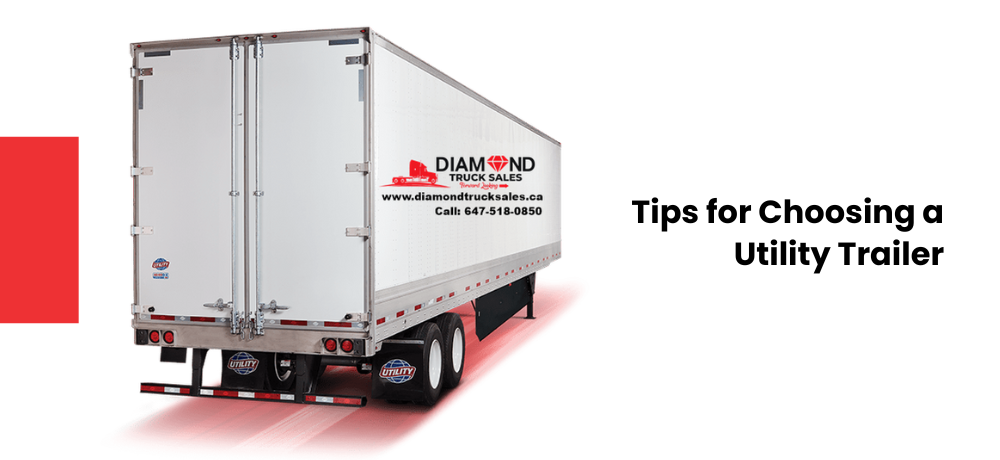Tips for Choosing a Utility Trailer

In the world of hauling and transportation, the choice of a utility trailer is a critical decision. Whether you're a seasoned trucker or a novice in the logistics game, selecting the right utility trailer can significantly impact your operations. At Diamond Truck Sales, we understand the importance of this decision and aim to guide you through the process. In this comprehensive guide, we will explore the key factors to consider when choosing a utility trailer, ensuring that your investment aligns perfectly with your needs.
Understanding Your Hauling Needs
Before delving into the intricate details of utility trailer specifications, it's essential to have a clear understanding of your hauling needs. Are you transporting heavy machinery, construction materials, or goods for long distances? The type of cargo plays a pivotal role in determining the appropriate size, weight capacity, and features required in a utility trailer.
Consider the dimensions and weight of your typical cargo to ensure that the trailer you choose can accommodate it comfortably. By aligning the trailer specifications with your specific hauling needs, you optimize efficiency and ensure the safety of both your cargo and your vehicle.
Trailer Types and Their Applications
Utility trailers come in various types, each designed for specific applications. Understanding these types will empower you to make an informed decision based on your unique requirements.
- Flatbed Trailers: Ideal for carrying large or irregularly shaped cargo, flatbed trailers provide versatility and easy loading and unloading.
- Enclosed Trailers: If you need protection from the elements for your cargo, enclosed trailers offer security and weather resistance, making them suitable for transporting sensitive goods.
- Dump Trailers: Designed for transporting loose materials, such as sand or gravel, dump trailers facilitate efficient unloading through hydraulic systems.
- Equipment Trailers: Tailored for heavy machinery, equipment trailers provide the strength and durability needed to transport substantial loads.
By identifying the specific type that aligns with your cargo and operational requirements, you narrow down your options and simplify the decision-making process.
Weight Capacity and Trailer Specifications
Once you've determined the type of trailer suitable for your needs, the next crucial consideration is weight capacity. Exceeding the weight limit of your trailer poses serious safety risks and can lead to mechanical issues for your towing vehicle.
Check the Gross Vehicle Weight Rating (GVWR) of the trailer to ensure it aligns with the weight of your cargo. Additionally, consider the axle capacity, ensuring it can handle the load without compromising stability or maneuverability.
Beyond weight capacity, pay attention to other specifications such as trailer length, width, and hitch type. These factors collectively contribute to the overall functionality and compatibility of the utility trailer with your hauling requirements.
Materials and Build Quality
The longevity and durability of a utility trailer depend heavily on the materials used in its construction. Given the diverse environmental conditions and loads trailers often endure, opting for high-quality materials is non-negotiable.
Aluminum and steel are common materials used in trailer construction, each offering its unique benefits. Aluminum is corrosion-resistant and lightweight, making it an excellent choice for improved fuel efficiency. On the other hand, steel provides exceptional strength and durability, ideal for heavy-duty applications.
Consider the terrain and weather conditions your trailer will encounter to make an informed decision on the most suitable material for your needs.
Ensuring Regulatory Compliance
As you navigate through the selection process, it's crucial to be mindful of regulatory requirements and safety standards. Different regions may have specific regulations regarding trailer dimensions, weight limits, and equipment specifications.
Ensure that the utility trailer you choose complies with all relevant safety standards and legal requirements. This not only avoids potential legal complications but also guarantees the safety of your operations on the road.
In conclusion, choosing a utility trailer involves a meticulous evaluation of your hauling needs, understanding trailer types, considering weight capacity, assessing materials, and ensuring regulatory compliance. At Diamond Truck Sales, we recognize the significance of this decision and are committed to assisting you in finding the perfect utility trailer for your operations.
We offer a diverse range of high-quality used trucks and trailers backed by years of industry experience. Our commitment to customer satisfaction extends beyond sales with additional services such as Truck and Trailer Leasing & Loan Financing.
To learn more about our offerings and how we can support your hauling needs, please click here. For any inquiries or assistance, feel free to call us toll-free at +1 877-840-1172 or email info@diamondtrucksales.ca. Your journey to choosing the ideal utility trailer starts with informed decision-making, and we're here to guide you every step of the way.